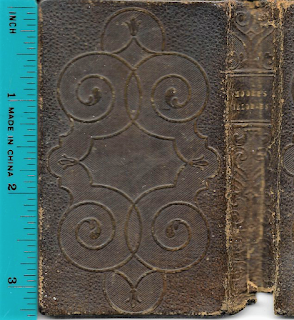In recent weeks I have been reading a lot about a return to "in-person worship" at our churches, leaving me to ask "Is there a new alterative to worship other than in-person that I do not know about?"
Do we really have to be in a church setting to worship properly? My knee-jerk impulse is to answer "no" to that question. Of course I am biased for obvious reasons...a serious health setback has made it next to impossible for me to attend church services the past couple of years. As a substitute for my inability to make it to church on Sundays I have immersed myself in Bible study and have looked for inspiration to post Christian messages on this blog site with a sense of mission, but still something is lacking.
I miss my life-long attachment to a church family and the deep-felt emotions stirred by a familiar church sanctuary and joining with others in prayer and song. I struggle with the question: Have I let circumstances distance me from the church, or has the church distanced me? The jury is out on that one.
Personally, I worship alone but in-person from the confines of my home.
But let's explore the question a little deeper.
One result of COVID lockdowns has been an increase in livestreaming/recording of worship services. In the past only large churches utilized these technologies to reach those unable to attend in person, but now thanks to the pandemic and thanks to Facebook even small churches have established on line livestreaming of their worship.Is this a good thing? Yes but with a caveat. When a person finds themselves in a circumstance where they are unable to worship with the saints on Sunday, they can (and should) still worship on their own time. John gives us this example when he was exiled, “I was in the Spirit on the Lord’s day” Rev. 1:10. (Most of) the elements of worship can be utilized without any externalities, including people, regardless of circumstance: singing to the Lord, praying to God, communion, meditating on God’s word, etc.
However, churches across North America have noticed a trend, some people are not coming back. Many people have gotten out of the habit of attending church worship services. But there is a small percentage of those people who are not returning that are still tuning into the livestreamed worship. They find it comfortable to remain at home, sit in their pajamas, and worship along with the church behind a computer. This is not good...It is laziness!
Hebrews 10:24-25 says, “And let us consider how to stir up one another to love and good works, not neglecting to meet together, as is the habit of some, but encouraging one another, and all the more as you see the Day drawing near.” The concept of meeting together is commanded in the vein of stirring up one another to love and do good works. Again, this is not about people who are sick or avoiding exposure to COVID -- this is about people who could attend, who feel comfortable in public, and still choose not to attend a Christian gathering. That is not okay -- that is “neglecting to meet together.”
In assembling, singing is “addressing one another in psalms and hymns and spiritual songs, praising and making melody to the Lord with your heart” (Eph. 5:19). How can you “address” others if you are sitting in your living room while your brethren are in the church building? Though you can hear them, your brethren can’t hear you when you are at home.
The Lord’s Supper is designed as a group-Church activity. The point is that Communion is not just between you and God -- it is serving of elements between the collective congregation and God.
There are other points we could make too, but the ultimate point I am making is this, if you can worship in person with your brethren, God wants you to do so.













